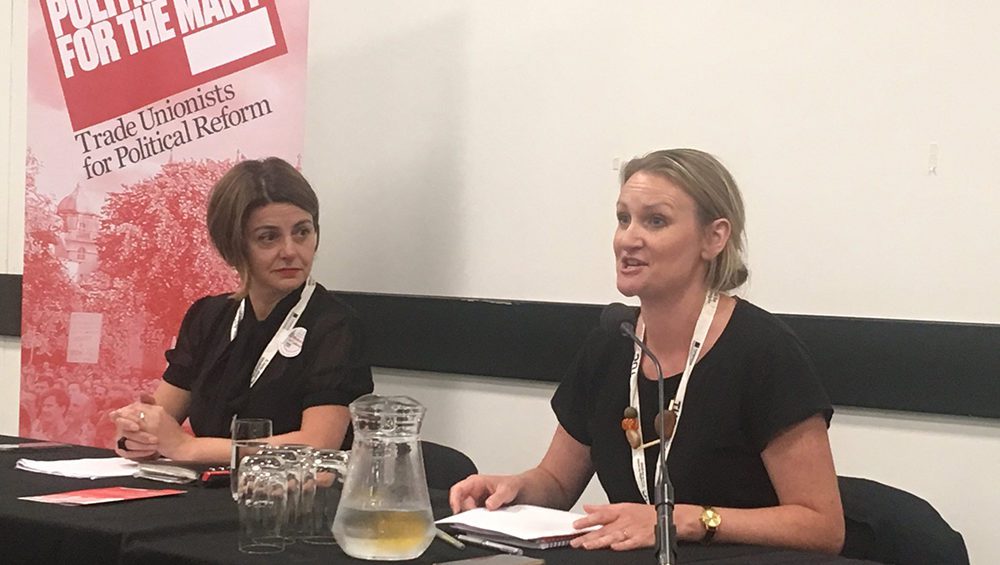
A week before the court case over prorogation reached the Supreme Court, the ERS’ Dr Jess Garland told TUC Congress delegates: “Our constitution is just a set of gentlemen’s agreements, with weak parliamentary checks and balances, made worse by an unelected upper chamber. This isn’t a democratic situation.” The ‘gentleman’s agreement’ has clearly broken down.
TUC Congress in Brighton saw leading reform campaigners and trade unionists came together to look at the state of British democracy today. It was clear that the past few weeks have shown how vulnerable our political system is to abuse.
One factor in the current crisis is the shockingly skewed results that blight our elections. The government knows it needs to get just enough votes under our current Westminster electoral system to have a parliamentary majority: under First Past the Post, that can be won with a fraction of public support. As a result, Parliament fails to properly represent Britain, and we have rule by minority. This is almost way of uniting the country.
But then again, our system isn’t set up to unite the country – it encourages ‘elective dictatorship’, it doesn’t unite or aim to find common cause. ERS polling found that 64% of people think the political system should encourage cooperation and working together, but only 19% think it does.
In the current context there’s a risk of voters thinking ‘a plague on all your houses’ – an anti-politics response. It is our job as reformers to channel that into something positive and show we can have a vibrant, genuine democracy.
The comments were echoed by PCS National Officer and Politics for the Many chair Lynn Henderson, who noted “Workers vs. Westminster sums up exactly where we are”.
Trade unions have always been at the forefront of demands for a democracy that is inclusive of working people – from the Chartists to the Scottish TUC’s campaigns for a Scottish parliament in the 1980s. Last month saw 200 years since the Peterloo massacre, in which working people led the way. The TUC’s Frances O’Grady has noted the PM has no mandate, and is ‘squatting’ in office to push a hard Brexit.
“Trade unionists are members of the biggest democratic movement and organisation in this country, and we are growing,” Lynn said. “When we come together and demand democracy, we bring the might of workers’ voices together across all sectors of the economy: our industrial power is also our political power.”
Through Politics for the Many, she is campaigning for political reform. Key amid the current debates is to help build a better democracy for workers in the future, not just protect the status quo that got us here.
At our recent ‘This is What Democracy Looks Like’ conference we saw dynamic discussion which will be pooled together in a report. “The conversation has only just begun – and we are opening it wider at conferences and events across the country,” Lynn noted.
She highlighted widespread recognition in the union movement that the culture and structure of politics is against the interests of the working class and trade unionists.
Sadly, this has sometimes been deprioritised, as unions understandably get caught up in the immediate industrial concerns (fighting for better pay, pensions and so on). But unions can no longer place democracy in the ‘too difficult to debate’ box. “Things can be different: but we need policies to challenge the elitist, establishment set-up.”
“That reform should start with abolishing the House of Lords and replacing it with an elected senate of the nations and regions, but also including electoral reform and citizens’ assemblies,” Lynn said.
On the current ‘crisis’ of Boris Johnson proroguing Parliament, she noted: “The outrage of cancelling parliament is something we need to scrutinise as campaigners and to remind ourselves that it doesn’t need to be like this.
“We, as trade unionists, are the biggest organised membership group of workers that can take political and industrial action to organise that change. Politicians are elected to represent us and it is our duty to ensure they do so.”
What happened in Peterloo 200 years ago showed that through sacrifice and solidarity we can force big steps forward. Now is one of the moments we can do that.
Politics for the Many – the trade union campaign for political reform – is campaigning for Labour and the unions to back political equality, including a fairly-elected second chamber and fair votes (PR) for the Commons.
Sign up to Politics for the Many and see the ERS and partners’ events at Labour conference.